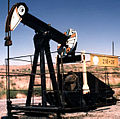Gasoline
Gasoline (also known as petrol in some regions) is a transparent, petroleum-derived liquid that is primarily used as a fuel in internal combustion engines. It consists mostly of organic compounds obtained by the fractional distillation of petroleum, enhanced with a variety of additives.
Composition[edit]
Gasoline is a complex mixture of hydrocarbons typically containing between 8 and 12 carbon atoms per molecule. The exact composition can vary widely, but the majority of gasoline is made up of paraffins (saturated hydrocarbons), olefins (unsaturated hydrocarbons), and aromatics (hydrocarbons containing a benzene ring).
Production[edit]
Gasoline is produced in oil refineries. Raw petroleum is processed in a series of steps to remove impurities and isolate the desired hydrocarbons. The most important process is fractional distillation, where the petroleum is heated and separated into its component parts, or fractions, based on their boiling points.
Uses[edit]
The primary use of gasoline is as a fuel for internal combustion engines, such as those found in cars, motorcycles, and small trucks. It is also used in some types of aircraft engines, and in portable engines such as lawnmowers and chainsaws.
Health and Safety[edit]
Exposure to gasoline can have a variety of health effects, and it is a significant source of air pollution. Gasoline vapors can cause dizziness, nausea, and respiratory problems, and long-term exposure can lead to more serious health issues. Gasoline is also highly flammable, and improper handling can lead to fires or explosions.
Environmental Impact[edit]
The burning of gasoline produces carbon dioxide, a greenhouse gas that contributes to global warming. It also produces other pollutants, including nitrogen oxides and particulate matter, which can have harmful effects on air quality and human health.
See Also[edit]
|
|
|
Gasoline[edit]
-
Gasoline in mason jar
-
Gasoline Comp
-
Nodding donkey
-
Gulf Offshore Platform
-
Gas Station Hiroshima
-
Antioxidant
-
Corn vs Ethanol production
-
DOT hazmat class 3 (alt 3)
-
Gasoline fire
-
US Regular Gasoline Prices Up to 2019
-
RBOB Gasoline Prices
Ad. Transform your life with W8MD's Budget GLP-1 injections from $75


W8MD offers a medical weight loss program to lose weight in Philadelphia. Our physician-supervised medical weight loss provides:
- Weight loss injections in NYC (generic and brand names):
- Zepbound / Mounjaro, Wegovy / Ozempic, Saxenda
- Most insurances accepted or discounted self-pay rates. We will obtain insurance prior authorizations if needed.
- Generic GLP1 weight loss injections from $75 for the starting dose.
- Also offer prescription weight loss medications including Phentermine, Qsymia, Diethylpropion, Contrave etc.
NYC weight loss doctor appointmentsNYC weight loss doctor appointments
Start your NYC weight loss journey today at our NYC medical weight loss and Philadelphia medical weight loss clinics.
- Call 718-946-5500 to lose weight in NYC or for medical weight loss in Philadelphia 215-676-2334.
- Tags:NYC medical weight loss, Philadelphia lose weight Zepbound NYC, Budget GLP1 weight loss injections, Wegovy Philadelphia, Wegovy NYC, Philadelphia medical weight loss, Brookly weight loss and Wegovy NYC
|
WikiMD's Wellness Encyclopedia |
| Let Food Be Thy Medicine Medicine Thy Food - Hippocrates |
Medical Disclaimer: WikiMD is not a substitute for professional medical advice. The information on WikiMD is provided as an information resource only, may be incorrect, outdated or misleading, and is not to be used or relied on for any diagnostic or treatment purposes. Please consult your health care provider before making any healthcare decisions or for guidance about a specific medical condition. WikiMD expressly disclaims responsibility, and shall have no liability, for any damages, loss, injury, or liability whatsoever suffered as a result of your reliance on the information contained in this site. By visiting this site you agree to the foregoing terms and conditions, which may from time to time be changed or supplemented by WikiMD. If you do not agree to the foregoing terms and conditions, you should not enter or use this site. See full disclaimer.
Credits:Most images are courtesy of Wikimedia commons, and templates, categories Wikipedia, licensed under CC BY SA or similar.
Translate this page: - East Asian
中文,
日本,
한국어,
South Asian
हिन्दी,
தமிழ்,
తెలుగు,
Urdu,
ಕನ್ನಡ,
Southeast Asian
Indonesian,
Vietnamese,
Thai,
မြန်မာဘာသာ,
বাংলা
European
español,
Deutsch,
français,
Greek,
português do Brasil,
polski,
română,
русский,
Nederlands,
norsk,
svenska,
suomi,
Italian
Middle Eastern & African
عربى,
Turkish,
Persian,
Hebrew,
Afrikaans,
isiZulu,
Kiswahili,
Other
Bulgarian,
Hungarian,
Czech,
Swedish,
മലയാളം,
मराठी,
ਪੰਜਾਬੀ,
ગુજરાતી,
Portuguese,
Ukrainian




